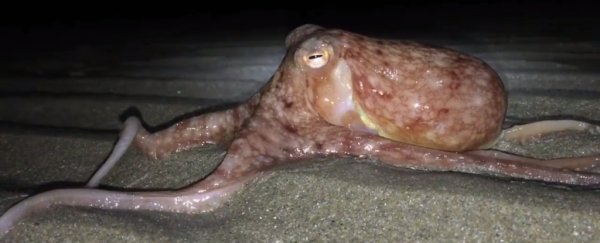Octopuses have been filmed taking night-time strolls out of the water and onto the shore on the coast of Ceredigion in Wales, UK.
More than 20 of the brainy cephalopods were spotted crawling out of the water after 10pm on Friday, when a local tour company manager and a group returned from a sunset trip.
"They were coming out of the water and crawling up the beach. We don't quite know what's causing it," Brett Jones, owner of dolphin tour company SeaMôr Dolphin Watching Boat Trips, told Wales Online.
"Perhaps it's because the sea has been quite rough recently, but I've never seen anything like it before. They were walking on the tips of their legs."
He said a friend told him they'd been doing it on Thursday night, too.
It's not the first time octopuses have been seen perambulating out of the water. In 2011, an octopus was filmed crawling over dry land at the Fitzgerald Marine Reserve in San Mateo County, California.
An episode of 2015 BBC documentary The Hunt, narrated by Sir David Attenborough, showed footage of an abdopus octopus crawling from rock pool to rock pool in search of prey.
And last year, Inky the octopus made international headlines when he escaped his tank in the National Aquarium of New Zealand, crawled across the room, disappeared down a drainpipe and fled out to sea.
Walking across dry stretches isn't uncommon for octopuses that live near the shoreline, according to marine invertebrate expert Julian Finn of Museums Victoria in Australia. It's just that most octopuses are nocturnal, so reasonably unlikely to be seen by humans when they go for a wander.
As for why they do it, well, it's probably because of food. When the evening tide goes out, "many octopus species emerge to hunt in the pools of water left behind by the receding tide," Finn told Scientific American in 2010.
But the behaviour of the Ceredigion octopuses doesn't fall into this category, Australian Museum cephalopod expert Mandy Reid told ScienceAlert.
"I think this situation is a little bit unusual. Occasionally octopuses might be living in a rock pool and walk across to another rock pool to feed. Having a whole lot of them coming out onto the beach is very strange behaviour," she said.
"If they're crawling out onto a beach, that's a very strange thing for them to do. The question would be why are they doing that, and that's a big unknown."
Changes to their environment, says Reid, could cause them to become disoriented. Normal rough waters wouldn't pose a problem for octopuses, but a big storm with raging seas could change their environment enough to confuse them.
Octopuses have gills, and need to be in the water to breathe, but they can survive for a short period of time if their skin stays moist - a few minutes at most, according to Reid. This is because they can absorb some oxygen through their skin from the water.
Whatever the Ceredigion octopuses are up to, it's proving dangerous for them. Jones reported on Facebook that he'd found a few dead ones on the beach at Clare Oxenham the following morning.
If anyone reading this is in the area, Reid advised collecting the corpses, if they're fresh enough.
"Collect them, put them in a freezer or methylated spirits to preserve them, and take them to a museum, or get in touch with the British Museum of Natural History," she told ScienceAlert.
"It may be that they have some sort of infection or parasites that are causing them to behave strangely, and experts might be able to have a look at them and shed some light on why they might be doing this strange thing."
Jones also helped a few live ones back into the sea - an action Reid supports.
"We collected the ones that were totally out of the water, and plopped them back in at the end of the pier, hopefully saving them from getting stranded," he wrote.
Editor's note: This article has been updated with comments from Mandy Reid.
